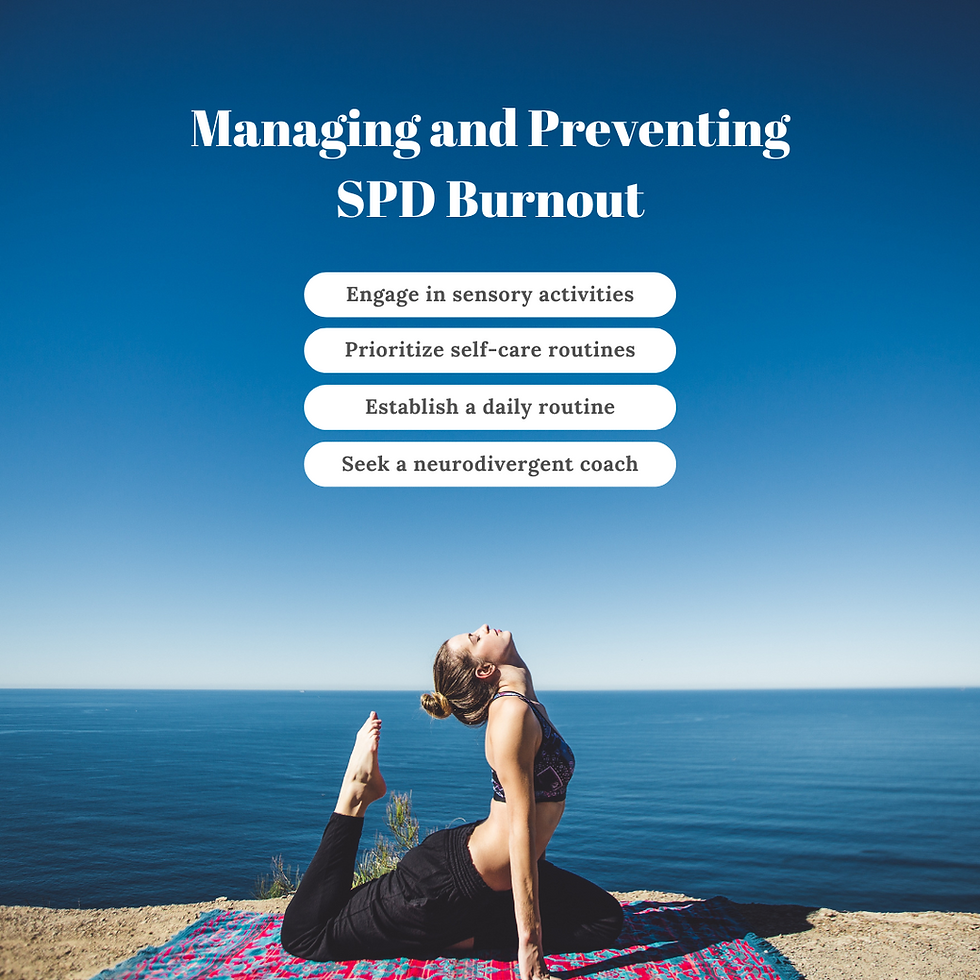Navigating Sensory Processing Disorder Burnout: Recognizing and Managing Overwhelm
- Gretchen Pound, PhD
- Jul 19, 2024
- 3 min read

Sensory Processing Disorder (SPD) is another way to be neurodivergent. It can significantly impact an individual's daily life, making seemingly simple tasks feel overwhelming and exhausting. Those with SPD often have to navigate a world filled with sensory triggers that can lead to a unique form of burnout. In this blog, we'll explore what SPD burnout is, how it manifests, and offer practical strategies for managing and preventing it.
Understanding Sensory Processing Disorder
Sensory Processing Disorder is a neurological condition, which falls in the neurodivergent realm. It is described as an individual's brain having difficulty processing and responding to sensory information from the environment. This can result in heightened sensitivities or, conversely, seeking sensory input. Common sensory challenges include sensitivity to light, sound, touch, taste, and smell, as well as difficulties with balance and body awareness.
What Is SPD Burnout?
Neurodivergent burnout occurs when the constant sensory input and effort required to cope with it become overwhelming, leading to physical, emotional, and mental exhaustion. It's crucial to recognize the signs and symptoms of SPD burnout to address them effectively. Furthermore, there is a level of masking that occurs with sensory processing disorder because it may not be acceptable to use certain soothing behaviors at work, school, or socially. Masking your neurological differences leads to burnout as well.
Signs and Symptoms of SPD Burnout
Increased Sensory Sensitivity: Those experiencing SPD burnout may become more sensitive to their triggers, leading to heightened discomfort and stress in sensory-rich environments.
Emotional Dysregulation: Emotional responses like frustration, irritability, anxiety, or even depression can become more frequent and intense.
Fatigue and Physical Symptoms: The constant effort to manage sensory input can lead to physical fatigue, muscle tension, headaches, and even stomach problems.
Difficulty Concentrating: SPD burnout can impair cognitive function, making it challenging to focus or make decisions.
Social Withdrawal: Individuals with SPD may withdraw from social activities and situations due to sensory overwhelm.
Managing and Preventing SPD Burnout
Engage in sensory activities that provide the right amount of input to stay regulated without becoming overwhelmed.
Prioritize self-care routines that help you relax and recharge, such as deep breathing exercises, meditation, or progressive muscle relaxation.
Learn to say no and set boundaries to protect yourself from excessive sensory input. Communicate your needs to friends, family, and colleagues.
Carry sensory tools like noise-canceling headphones, fidget toys, or stress balls to help you cope with unexpected sensory challenges discreetly.
Make your home and workspace sensory-friendly by reducing clutter, controlling lighting and noise, and using sensory-friendly materials in your surroundings.
Establish a daily routine to create predictability in your life, which can help reduce anxiety related to sensory experiences.
Seek a neurodivergent coach who can provide guidance and coping strategies.
Conclusion
Neurodivergent burnout is a real and challenging aspect of living with SPD. Recognizing the signs and actively managing sensory challenges can make a significant difference in preventing burnout and improving your overall well-being. Remember that seeking professional guidance and support is essential to create a tailored approach to managing your SPD effectively. By incorporating these strategies into your daily life, you can navigate sensory overload more successfully and find balance and comfort in your sensory world.
If you are a neurodivergent individual struggling with burnout due to fear of being yourself, please reach out for support through individual or group coaching sessions. Moreover, if you are a company wanting to create a more neuro-inclusive workplace, please call Dr. Gretchen, your Neurodivergent Coach at 858-224-2889 or email gretchen@healthierlifecoaching.com to learn more detailed information.
And Remember
"I want to make a difference in people’s lives!
I work to ensure everyone has an
equal opportunity to succeed."
-- Gretchen Pound, PhD
